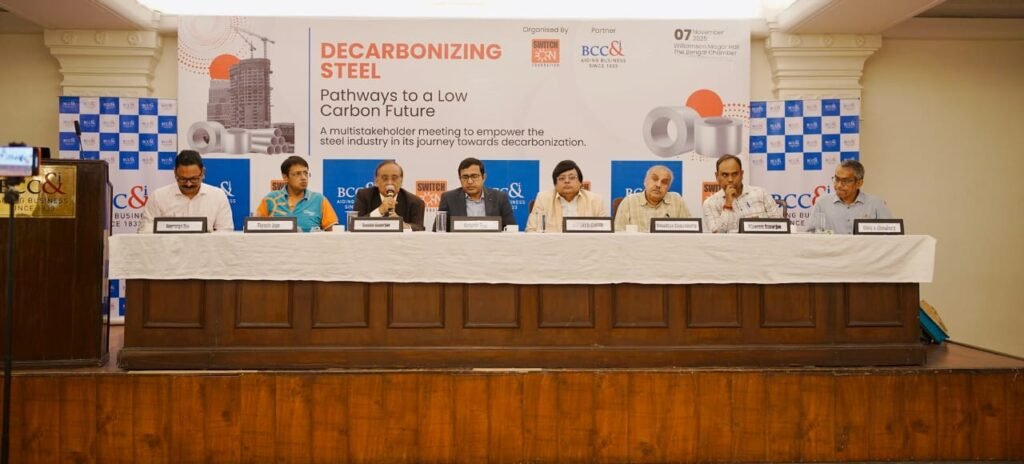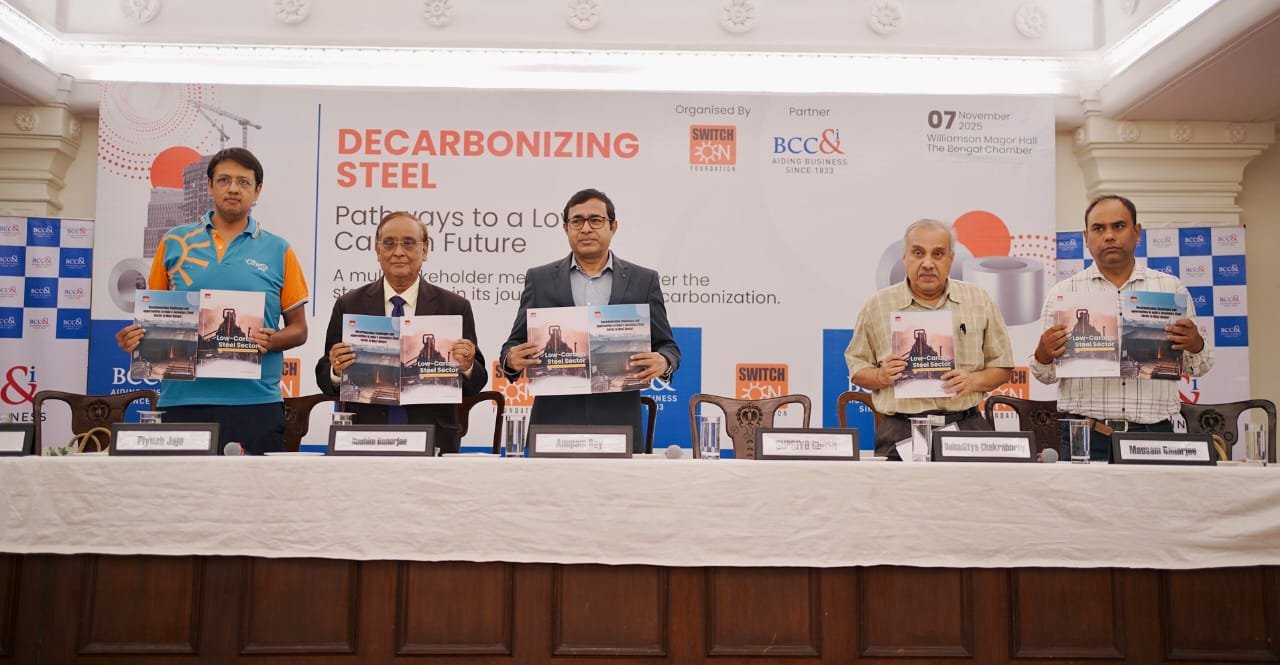Kolkata, 09 November 2025: On 07th November 2025, the Environment Conservation Society (SwitchON Foundation), in partnership with the Bengal Chamber of Commerce & Industry (BCC&I), successfully organized a multistakeholder event titled “Decarbonizing Steel: Pathways to a Low-Carbon Future: A multistakeholder meeting to empower the secondary steel industry towards decarbonisation”. The event brought together industry leaders, policymakers, financial institutions, technical experts, and MSME steel producers to deliberate on actionable strategies for decarbonising the secondary steel sector.
The event centered around the release of reports on India’s steel sector – “Low-Carbon Steel Sector: Perspectives on Interventions & Challenges” and “Decarbonisation Challenges and Opportunities in India’s Secondary Steel Sector: A Stakeholder Perspective. The event brought together industry leaders, policymakers, and experts to deliberate on the pathways for a just and sustainable transition of one of India’s most vital industries. The session created a dynamic platform for open dialogue among stakeholders from MSME clusters in Eastern India, alongside representatives of integrated steel producers, government agencies, industry associations, financial institutions, energy auditors, and solution providers.

The reports highlighted that as India, the world’s second-largest steel producer, expands towards a target of 300 million tonnes by 2030, it faces both pressing climate responsibilities and significant opportunities in emerging global green steel markets. The research underscored the need for collaborative action across government, industry, and civil society to enable decarbonisation, ensure competitiveness, and safeguard livelihoods.
The dialogue resulted in several key outcomes that will guide the sector’s transition towards sustainability. Financing pathways were mapped, exploring mechanisms such as low-cost loans and carbon credit utilisation, and linking MSMEs with financial institutions and carbon market platforms. The event highlighted technological opportunities, showcasing Best Available Technologies (BAT), green hydrogen applications, and other emerging low-carbon innovations tailored for the MSME sector. At the same time, the discussion assessed critical capacity-building needs, mapping MSME readiness gaps and connecting them with energy auditors, renewable energy providers, and government support schemes to strengthen technical capabilities. Importantly, a structured dialogue on market creation was initiated, laying the groundwork for developing a robust low-carbon steel market and promoting demand for sustainable steel products in the future.
Speaking on the occasion, Anupam Ray, Senior Advisor, SwitchON Foundation, said: “Hydrogen and Carbon Capture, Utilisation, and Storage (CCUS) – based solutions are maturing, but some solutions, like renewable energy, the use of scrap, and energy efficiency, can help in decarbonising steel immediately. They would be cost-effective as well”.
Adding the perspective of secondary producers, Supriyo Ghosh, Chairperson of National MSME Committee, BCC&i stated: “Secondary steel producers form the backbone of India’s steel ecosystem. To move towards a greener future, MSMEs must be given the right technical guidance and access to affordable finance. Only then can we build a truly inclusive and competitive low-carbon pathway for the sector.”
In the event, SwitchON Foundation and EarthON Foundation jointly, in collaboration with the Rajiva Sinha Foundation, announced the launch of the Greenovation Challenge on Green Steel. The initiative aims to identify and support innovative, pilot-ready solutions for decarbonising India’s steel sector — one of the country’s most emission-intensive industries. With India’s steel production projected to rise from 150 million tonnes to over 300 million tonnes by 2030, the initiative seeks scalable, cost-effective, and pilot-ready solutions in areas such as renewable energy, green hydrogen, carbon capture, circularity, and process/technology interventions for energy efficiency. As India’s steel production is projected to double by 2030, this challenge seeks to accelerate the transition toward low-carbon, energy-efficient, and circular industrial practices, while fostering collaboration between startups, research institutions, and MSMEs to drive India’s green industrial transformation.
The event served as a platform for dialogue on India’s path to aligning industrial growth with climate goals. The discussions reaffirmed the importance of innovation, circular economy practices, renewable integration, and green finance in shaping the country’s steel sector transformation.
The reports presented in the meet will serve as reference points for policymakers, industry leaders, and academia to collectively chart out strategies for an equitable and low-carbon future for India’s steel sector.



